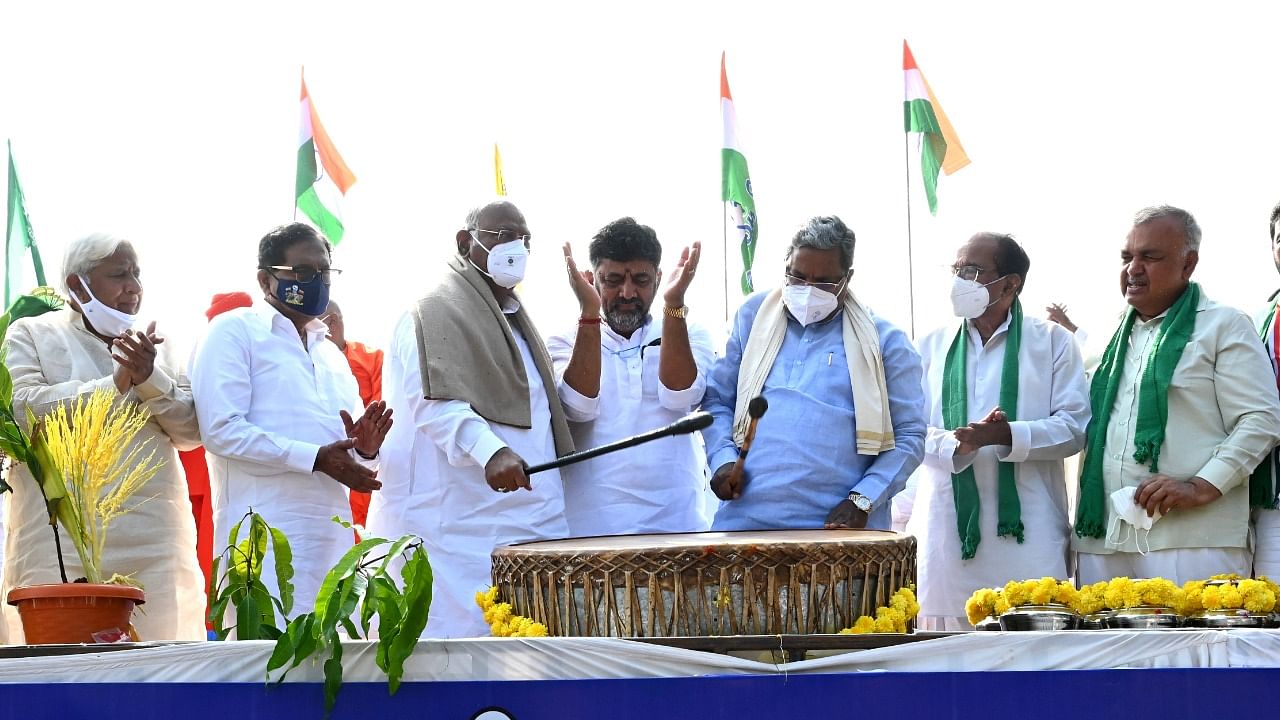
With the Congress holding a 'padayatra’ demanding early implementation of the Mekedatu project, the water dispute between Karnataka and Tamil Nadu (TN) has come to the fore once again. The long-pending demand from Karnataka to set up a balancing reservoir at Mekedatu across the Cauvery river costing Rs 9,000 crore, near Kanakapura in Ramanagara district, has now turned into a political slugfest between the Congress and the BJP.
Karnataka says that it has the right to take up the project as the decision of the Cauvery Water Dispute Tribunal (CWDT) in 2007, modified by the Supreme Court in 2018, didn’t prohibit the state from constructing any project within its territory as long as Karnataka ensured the release of 177.25 tmcft (thousand million cubic feet) of water in a normal water year at the inter-state border Biligundlu.
The state also cited Clause XXI of the CWDT award which recommended taking up hydro projects on the common reach of the river through the National Hydro Power Corporation. But this clause doesn’t apply since Mekedatu is above the common reach of the river. However, the right to construct or operate is subject to the granting of Environmental clearances and the decision of the Cauvery Water Management Authority (CWMA). CWMA consists of all riparian states.
Karnataka has been pressing the central government for early approval of its Detailed Project Report (DPR), submitted in 2019, which aims to provide drinking water to Ramanagara and Kanakapura regions besides setting up a 400-MW hydropower plant.
Though the CWMA, in its agenda for meetings, mentioned the Mekedatu project thrice in the last eight months, the discussion could not be taken up due to the lack of consensus between Karnataka and Tamil Nadu. Indeed, Union Water Resources Minister Gajendra Shekhawat, in his written reply in Parliament, said the project required approval from the CWMA. Since the project was proposed across an inter-state river, it required approval of lower riparian states too (Kerala and Puducherry), as per the inter-state Water Dispute Act. "The same has been told to Karnataka”, the Union minister had said. He had pointed out that as per the CWDT and the final award (modified by the Supreme Court), acceptance of CWMA would be a pre-requisite for consideration of the DPR by the Ministry.
Karnataka had submitted a Feasibility Report (FR) for the Mekedatu project in 2018 to the Central Water Commission (CWC) seeking "in-principle" clearance for preparation of DPR. The Screening Committee of CWC accorded clearance for the same, with certain conditions, in October 2018. Subsequently, Karnataka submitted the DPR to the CWC in January 2019; it was then referred to the CWMA for consideration.
The Union Ministry of Environment and Forests has declined to frame the terms of reference for clearance of the project on the ground that the inter-state issue has not been sorted out. Getting consensus is not an easy task in the CWMA. Normally, Tamil Nadu and Puducherry stand together in opposing the project; Kerala's stand remains uncertain. When it comes to voting in the CWMA meetings, getting a majority on the Karnataka side is a tough task, says an official in the Jal Shakti Ministry.
TN’s apprehension
Tamil Nadu apprehends that Karnataka, by building the Mekedatu project, may deny to it its share of water. At present, there are three petitions pending before the Supreme Court — one filed by Karnataka seeking rights on 91 tmc surplus water generated on its side of the river basin; second, a petition filed by TN opposing Mekedatu project; and, third by TN against the order by the National Green Tribunal (NGT) Principal Bench which stayed the NGT's Southern Bench's order to send an expert committee to Mekedatu to find and inspect construction activities started by Karnataka.
Officials at the Jal Shakti Ministry say the Centre has a limited role at this juncture as the matter is pending before the Supreme Court. Though the Centre did place Karnataka's DPR in the CWMA, it faced opposition from TN and Puducherry, said one official. Even if the Supreme Court and the Centre approved the project, getting environmental clearances is another challenge as it is estimated that around 5,051 hectares of forest land, mostly falling under the Cauvery Wildlife Sanctuary, will be submerged.
Another option before Karnataka is to file an original suit in the Supreme Court seeking a declaration that the state has the right to build the Mekedatu project — it will not cause any harm to TN. Since the original suit will give an opportunity to Karnataka to argue in length and put forth expert evidence, the state can explore this after getting a consensus among all political parties. If the SC rejects this plea, the state can again approach the Apex Court seeking to set up another Tribunal as it did in the Krishna water dispute to decide the status of the surplus water, says a legal expert.
Interestingly, though there is a long history of all political parties presenting a united picture to protect the interest of Karnataka when it came to land and water issue, for the first time perhaps, the political parties are talking in different voices on the inter-state water dispute.
Political consensus is always important on issues like water as it is an emotional matter for every state. Opposition parties say the BJP government did not convene any all-party meeting to discuss Mekedatu so far, unlike the other Cauvery matters. In a way, the Karnataka politics is showing signs of going the Tamil Nadu way in the manner politics was played out until recently, where bitter rivals DMK and AIADMK never agreed with each other on the Cauvery (or for that matter, on any other issue). The Congress’ march to Bengaluru might help generate awareness to claim the state's rights over the Cauvery water to some extent, but it has definitely and unfortunately created a division among the political parties as well as the public on an important issue.
